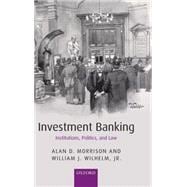
What is included with this book?
| Prologue | p. vii |
| List of Figures | p. xi |
| List of Tables | p. xiii |
| Introduction | p. 1 |
| Market trends | p. 7 |
| Industry structure | p. 15 |
| Investment bank activities | p. 21 |
| The growing dichotomy between specialists and generalists | p. 30 |
| Conclusion | p. 35 |
| Institutional Theory | p. 37 |
| Property rights, institutions, and the state | p. 38 |
| Non-state institutions | p. 45 |
| State decision-making, the law, and extra-legal contracting | p. 59 |
| Conclusion | p. 62 |
| An Institutional Theory of Investment Banking | p. 65 |
| Information, innovation, and property rights | p. 67 |
| Information marketplaces and investment banking | p. 71 |
| Internal organization | p. 88 |
| Industrial organization | p. 92 |
| Conclusion | p. 95 |
| Investment Banking Origins | p. 97 |
| Information exchange | p. 98 |
| Institutions and the law | p. 101 |
| Mercantile networks | p. 107 |
| Early capital markets | p. 117 |
| Conclusion | p. 120 |
| The Rise of the Investment Bank | p. 121 |
| Merchant banking | p. 123 |
| The legal and political environment | p. 126 |
| The evolution of investment banking | p. 136 |
| Conclusion | p. 153 |
| Investment Banking in the Age of Laissez-Faire | p. 155 |
| Legal and political environment | p. 156 |
| Technological advances | p. 157 |
| The Civil War and retail investment banking | p. 160 |
| Investment bankers after 1873 | p. 162 |
| Investment banking after 1873 | p. 170 |
| Conclusion | p. 184 |
| Leviathan and the Investment Banks | p. 187 |
| Changes to the legal and political environment | p. 188 |
| Legislation, regulation, and investment banking | p. 196 |
| Industry evolution | p. 215 |
| United States versus Morgan Stanley | p. 220 |
| Conclusion | p. 223 |
| The Modern Industrial Revolution | p. 225 |
| Early computer advances | p. 227 |
| Early changes to market structure | p. 231 |
| Real-time computation | p. 238 |
| The revolution in financial economics | p. 242 |
| New human capital businesses | p. 249 |
| Conclusion | p. 263 |
| Inside the Investment Bank | p. 265 |
| Investment bank partnerships | p. 267 |
| The joint-stock investment bank | p. 280 |
| Conclusion | p. 291 |
| What Next? | p. 293 |
| Large, complex banking organizations | p. 294 |
| Small, focused investment banks | p. 300 |
| Conclusion | p. 309 |
| Bibliography | p. 311 |
| Index | p. 333 |
| Table of Contents provided by Ingram. All Rights Reserved. |
The New copy of this book will include any supplemental materials advertised. Please check the title of the book to determine if it should include any access cards, study guides, lab manuals, CDs, etc.
The Used, Rental and eBook copies of this book are not guaranteed to include any supplemental materials. Typically, only the book itself is included. This is true even if the title states it includes any access cards, study guides, lab manuals, CDs, etc.